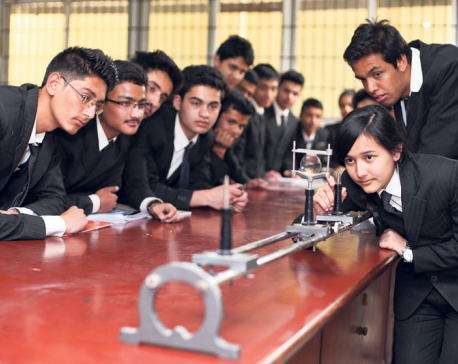
OR
Formation of Nepal Communist Party
With the formation of Nepal Communist Party (NCP) the much-awaited unification between the two largest communist parties of Nepal has materialized, paving the way for the new party to rule the country for the next four years and even more if they can deliver on development and good governance. The unity process had taken seven months since it was announced in October. This is good news for communist voters and sympathizers who wanted to see their leaders come together under one umbrella. And this will also be good to the country if leaders of new party live up to the promise of stability, development, rule of law and good governance. In that sense, communist unity is a welcome development for the country if they do not deviate from the promises made to the people. With way too many political parties—over 100 registered in Election Commission of Nepal at one time—Nepali politics had not only become fractured but it had also made it easier for smaller parties to switch alliances with one or other of the big parties in making and breaking of the governments. Nepal has had this bitter experience for over 20 years. Thus it is good of like-minded political parties to unite to form a big entity. Non-communist parties could form a democratic party under leadership of Nepali Congress, beginning the practice of two-party system, which is found to be relatively better than having many parties. But there are some concerns the unified party must heed.
Nepal Communist Party is going to be an indomitable force in Nepal—as long as the unity remains intact. A party is going to lead an overwhelming majority government single-handedly for the first time after many years. The NCP will have control at all levels of government and state machineries—from the center to provinces to local levels. We have President, Prime Minister, chairman and vice-chairman of National Assembly, speaker and deputy speaker of the House of Representatives coming from NCP. It also leads six out of seven provincial governments with their own speakers and deputy speakers in six provincial assemblies. Now NCP has 39 out of total 59 seats in Upper House and 174 out of 275 seats in the House of Representatives. As Prime Minister K P Sharma Oli said on Thursday, they are everywhere in the state—from the center to the grassroots. This is why they must tread carefully, for as the old adage goes absolute power corrupts absolutely. Absolute power also gives rise to authoritarian tendencies as evidenced in other countries.
The communist force will have to guard itself against censoring the free press, undermining human rights and freedom of expression—the fundamental tenets of democracy. Elsewhere, communists are found to be intolerant toward opposing views and persecuting the dissenters. Expressed or unexpressed, one of the concerns of the international community in Nepal has been this. NCP should demonstrate with action that they are different. The sole focus of the government should now be ensuring development, prosperity, rule of law and good governance without compromising any of the fundamentals of democracy. As long as the NCP remains committed to this cause, it will have a brighter future. But for Nepalis, who have witnessed several epoch-making political changes since 1990s, this unification will mean nothing if the government fails to make any changes in the life of general people. The new party will be tested on how sincerely it will work to address concerns of common people and making federal democratic republic system functional.
You May Like This

Chinese rail link will usher in new era of possibility: Minister Karki
KATHMANDU, May 14: Nepal has expressed hope that connectivity of Chinese railroad as part of One Belt One Road (OBOR) initiative... Read More...

Letter grading: SLC leaps into the modern era
The newly-introduced letter-grading system for the School Leaving Certificate (SLC) has become a topic of discussion. This is the first... Read More...



Just In
- World Malaria Day: Foreign returnees more susceptible to the vector-borne disease
- MoEST seeks EC’s help in identifying teachers linked to political parties
- 70 community and national forests affected by fire in Parbat till Wednesday
- NEPSE loses 3.24 points, while daily turnover inclines to Rs 2.36 billion
- Pak Embassy awards scholarships to 180 Nepali students
- President Paudel approves mobilization of army personnel for by-elections security
- Bhajang and Ilam by-elections: 69 polling stations classified as ‘highly sensitive’
- Karnali CM Kandel secures vote of confidence















Leave A Comment